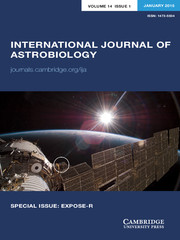Article contents
Astrobiology and its influence on the renewal of the way we see the world from the teloempathic, educational and astrotheological perspective
Published online by Cambridge University Press: 28 May 2020
Abstract
There is a record of the positive effects of astrobiological research for the natural sciences and eventually for their technological use on Earth. However, on the philosophical effects, this is not as visible as the other sciences, which is why it can be assumed that it is a waste of time speculating on astrobioethics or also on the philosophy of astrobiology. This is the reason why this work seeks to identify and sustain the philosophical utility of astrobioethics. To achieve this, this article focuses on three essential aspects: teloempathy, education and astrotheology. Russell's argument about the value of philosophy will be used as a fundamental basis for the usefulness of astrobioethics.
- Type
- Research Article
- Information
- Copyright
- Copyright © The Author(s), 2020. Published by Cambridge University Press
References
- 4
- Cited by





